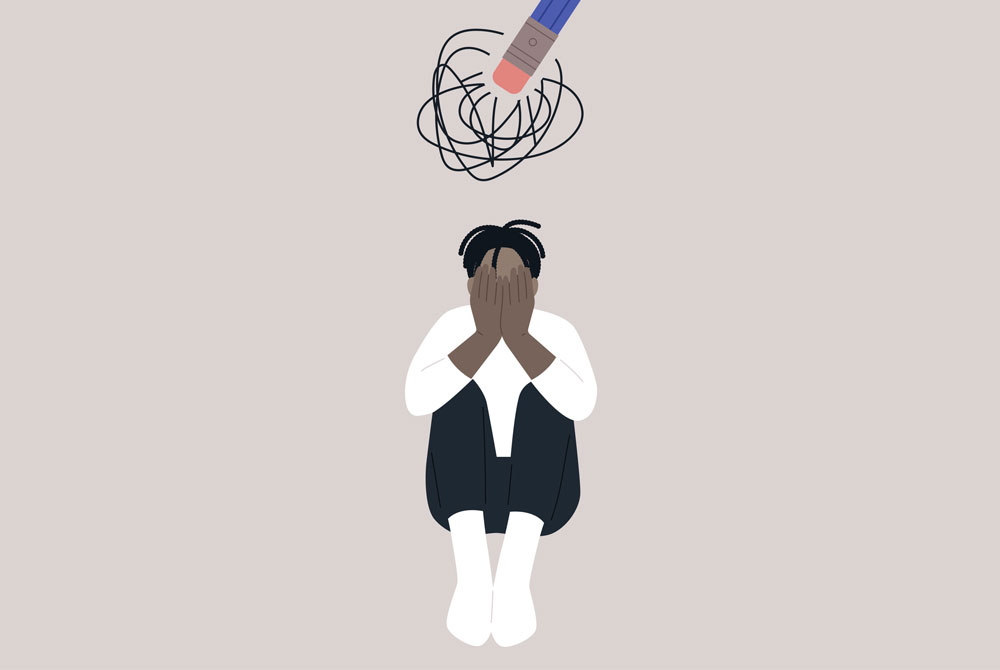 Photo from Getty Images
Photo from Getty Images
Originally Posted On: https://illuminaterecovery.com/blog/mindfulness/
Using mindfulness techniques for addiction recovery is one way to face the intense emotions of the early stages of recovery. Mindfulness techniques can help you cope when struggling with various emotional responses and triggers. Since extreme emotions can impact you both mentally and physically, practicing mindfulness-focused breathing strategies, physical exercise, or even writing exercises can help you to deal with them effectively.
Your emotions in early recovery can be a whirlwind. Starting your recovery journey is a huge step in a lifelong process. You can expect to face highs and lows throughout, but with the right support, you can face any challenge with techniques and tools to keep you on track.
You might have turned to addictive substances to deal with the struggles and challenges of life. Self-medicating can help numb pain and allow you to forget the world around you. When in early recovery, though, you will likely find yourself having to confront emotions that once would have led you to turn to substances. Coping with emotions in early recovery without your old go-to can be difficult. To respond healthily, it’s important to be present and attentive to the emotions you are experiencing but careful that you aren’t swept up by them.
Why Is Early Recovery So Unique?
Many individuals in recovery associate their substance use with emotional regulation. Substances like alcohol can provide a euphoric or calming effect, and this effect can quickly become a way to cope with stressful or uncomfortable instances, situations, or people. While many people may occasionally partake to deal with a bad day, those who develop a dependency often rely on substances for regular emotional control.
Regular use of substances to numb or control emotions can mean true emotions can be pushed beneath the surface. You can become hardwired to gain access to your substance of choice, often neglecting self-care emotionally and physically. In time, the substances start to control emotional responses, leading to rash behavior, situational misunderstandings, and a general inability to truly connect with thoughts and emotions.
Early recovery is unique because it is a time of emotional reawakening. When you make the decision to stay sober, you are putting yourself in a position to take care of your emotional needs again. You are likely to experience a range of emotions that you may have been keeping numb for years.
When you open yourself up again emotionally, it can be rewarding but also frightening. That’s why finding ways to manage emotional highs and lows can be extremely beneficial in early recovery.
Emotions Experienced During Early Recovery

Life is full of moments and obstacles that create an emotional response. Most individuals have had years of coping and experiencing their emotional responses and know how to deal with those responses. However, in early recovery, it can feel like you are experiencing these emotional responses for the first time. This can be overwhelming and can even contribute to relapse.
Understanding the unique emotions you may experience during early recovery can help you prepare and develop techniques that can enable you to see these emotions through.
Emotions in early recovery can be a rollercoaster, to say the least. For the first weeks and months of early recovery, it is normal to feel as though your emotions are all over the place.
This can be caused by several different factors, such as:
- Withdrawal
- Chemical changes in the body
- The stress of making a significant life change
- Consequences of your addiction
- Concerns about the future
Fluctuations regarding the emotions you are feeling can be most intense during early recovery. While stress and concerns are constant throughout life, the ability to deal with them can be the hardest as you begin recovery. Learning various strategies to cope effectively is the best way to ride out the rollercoaster. In addition, it’s important to remind yourself that your emotions will settle down over time.
Emotional Immaturity
In early recovery, you may not have the strategies you need to cope effectively with your feelings. This immaturity in regulating emotions can be caused by prolonged avoidance or may be the reason you turned to drugs or alcohol in the first place. As you adjust to living in recovery, you will begin the process of developing an emotional maturity that will help you face your emotions and cope with them.
Feelings of Worthlessness
There can be a great deal of shame and guilt associated with substance abuse. It can be extremely difficult to practice self-compassion, but having compassion for yourself allows you to deal with feelings and challenges that are overwhelming. Finding ways to improve your self-esteem and redirect destructive thinking can help you maintain sobriety.
Overwhelming Feelings of Stress
Substance dependence often starts with a desire to escape the stresses of life. Drugs and alcohol can numb the emotional responses to these stressors, but at the end of the day, these stresses don’t simply disappear. Early recovery is also full of stressors and triggers that once may have resulted in substance use, but when you choose sobriety, you find a way to deal with these emotions in a healthy way. Utilizing mindfulness techniques is one way you can reduce the emotional responses associated with stressful situations.
Anger
In addition to shame and guilt, many individuals in early recovery can struggle with anger management. When emotions are high, it can be difficult to think rationally. You may be angry at yourself, other people, or certain situations that can trigger an irrational response. The inability to deal with and control anger can make it difficult to make meaningful connections with others which can be beneficial for long-term recovery.
 Photo from Getty Images
Photo from Getty Images
It takes practice to learn how to cope with emotional triggers in early recovery. You want to fill your sobriety toolbox with techniques and methods that you can rely on in the moment and as a daily activity. A great place to start is to become aware of your emotions. Forcing yourself to stop and think about what you are feeling and why you are feeling it can help you better manage the reactions you have to those emotions.
Instead of autopiloting through your emotions, being aware and mindful gives you back a sense of control. You can decide how you will respond to the emotions you are experiencing. Mindfulness techniques help you to stop, reflect, and ultimately choose how you want to respond.
Why Mindfulness?
We’ve mentioned how beneficial mindfulness techniques can be during early recovery. So, what is mindfulness, and how can it help you cope with emotional triggers? Mindfulness is all about being present in the moment. Instead of dwelling in the past or worrying about the future, you are focused on just the here and now.
When you can actively be a part of the present moment, you are minimizing the impact of invasive thoughts and feelings that exist as a result of past traumas and experiences. With mindfulness, you are allowing yourself the freedom to be in the moment and prevent yourself from getting caught up in things you can’t control.
How Mindfulness Can Help
The ability to stay present in the moment can be extremely beneficial for those in early recovery. Whether you have been sober for a few days or a few weeks, you have a lot of emotional baggage to unload. As mentioned, though, combating negative emotions and stressors can take practice. When you are starting your sobriety journey, you may be trying to restore not only your health but also your employment status, educational status, and relationships. This can feel overwhelming enough without intrusive thoughts that can make recovery even more complicated.
When you feel overwhelmed by emotions, you can make irrational, emotionally immature decisions. This can impact your ability to maintain sobriety. However, practicing mindfulness can help you stay on track. Instead of allowing waves of emotions to bombard you, you can actively choose to just focus on what is happening at that particular moment. The popular phrase “one day at a time” is used by many in recovery. Mindfulness provides a reminder that sometimes it’s one hour at a time or even one minute at a time.
Suggested Reading: How to Combat Negative Thinking
Using Mindfulness in Early Recovery
 Photo from Getty Images
Photo from Getty Images
Mindfulness takes practice at first, but it can quickly become a natural response to various internal and external stressors in many different forms throughout your day. What is most important is finding what works for you. The ultimate goal is to get yourself to a point where you can center yourself and focus just on the situation at hand. Inner reflection helps you to face your emotions, understand why you are experiencing that response, and choose what you want to do with those emotions.
Exploring The Mind-Body Connection
One helpful strategy for using mindfulness in early recovery is to explore the connections between body and mind. Emotions trigger responses in the brain that can manifest physically. This can be feelings of euphoria, dread, increased heart rate, trouble breathing, and more. In early recovery, you may be relearning these responses or experiencing them for the first time. Understanding how you physically react to emotional stressors can help you better control the experience. Mind-body awareness can be developed and strengthened through physical mindfulness techniques.
For example, exercise can be a great tool, whether you enjoy peaceful hikes through nature, hitting a punching bag, or a quick yoga class. Meditation and breathing techniques are also great ways to stay present and become more aware of your triggers. Sensory items can also help a person practice mindfulness, such as a worry stone, bracelet, or coin that can be easily carried and used as a calming tool.
Journaling and Daily Affirmations
Mindfulness is an ongoing process. You must be willing to stop and assess your emotional responses at any given time. It can help to start the day with a clear intention. For support, journaling or reading a daily affirmation is a great way to get yourself in a positive mindset. Affirmations are perfect for a quick quote or reminder throughout the day to stay present and positive.
You can find lists of affirmations online or through an affirmation journal. When you feel yourself experiencing an intense emotional response, you can stop, remind yourself of your affirmation, take a breath, and assess how you want to react. Even if you don’t choose to focus on affirmations, journaling is a great opportunity to stay present and keep a safe place to explore your deepest thoughts and feelings without the worry of judgment.
A daily journal can help you reflect on your current emotional state, explore triggers, and understand why you respond the way you do. Journals are also ideal for seeing how far you’ve come in your journey. As you transition out of the stages of early recovery, you’ll likely see a growth in your ability to face, understand, and rationally react to triggers in your life without feeling the need to turn to drugs or alcohol.
Work With a Therapist
Meeting one on one with a therapist can help you develop other mindfulness techniques for addiction recovery. A therapist is there to provide a safe environment for you to talk through your feelings and explore ways you could manage specific, current issues in your life.
It is easy to stay focused on the past or dread the future, but with a therapist’s support, you’ll learn how to stay focused on what is happening in the here and now. This is the best way to understand that emotions can be fleeting and that you can cope with the highs and lows of sober living.
Suggested Reading: The Importance of Practicing Mindfulness
Mindfulness Helps with Early Recovery Emotions

Drug and alcohol use serves to numb your emotions, but many people who start the early recovery journey find that these emotions can come flooding back. Mindfulness practices are a great way to face these emotions as they come and prevent them from becoming overwhelming. Developing the ability to self-reflect in the moment helps you control your emotional responses to various life triggers.
At Illuminate Recovery, we recognize the benefits of mindfulness, especially during early recovery. Our intensive outpatient treatment program helps you focus on becoming more mindful and present in your life in recovery. If you are struggling with coping in early recovery, we can help – reach out today to speak with our compassionate staff.




